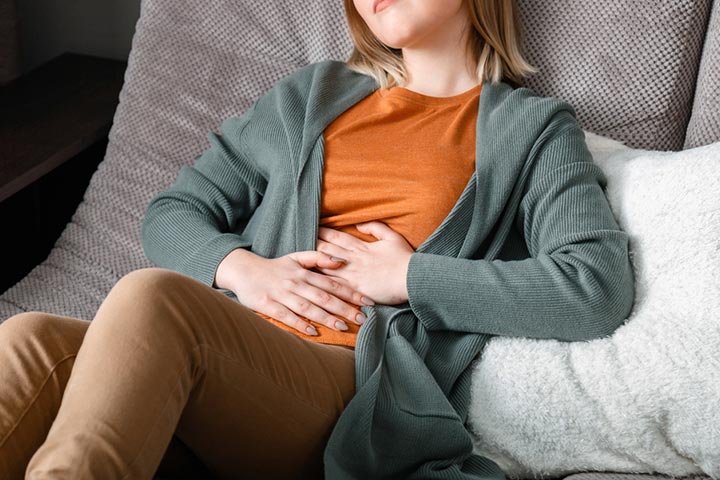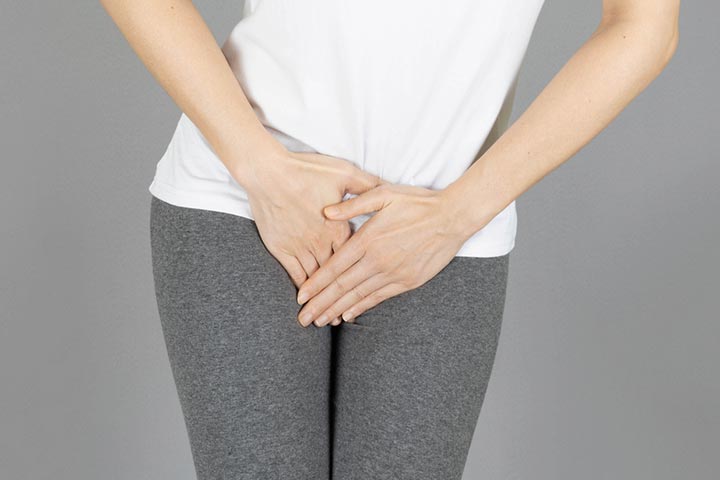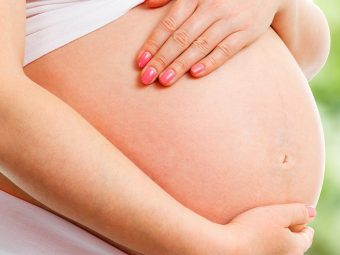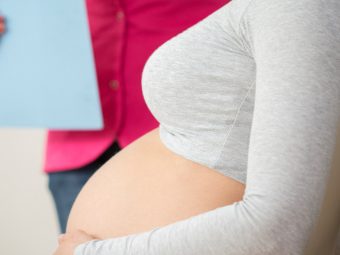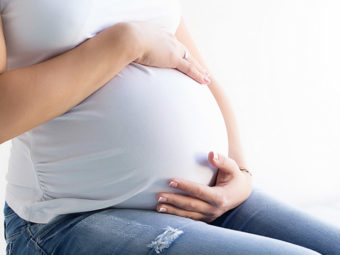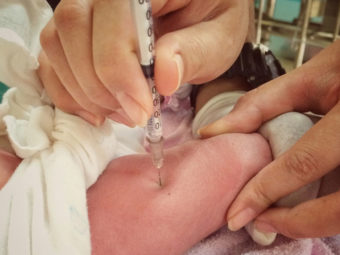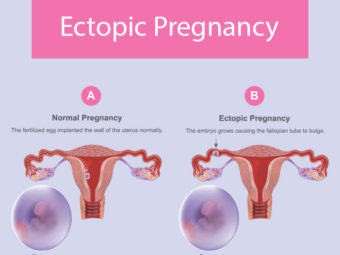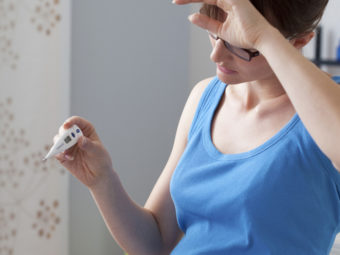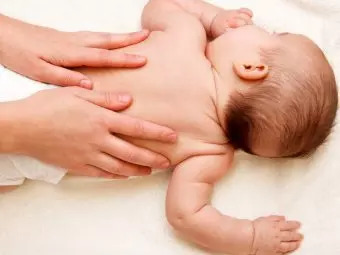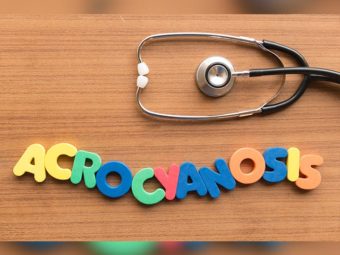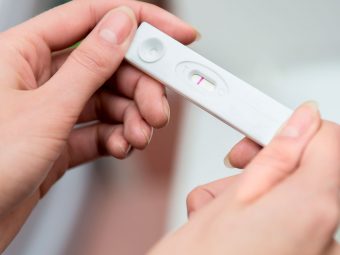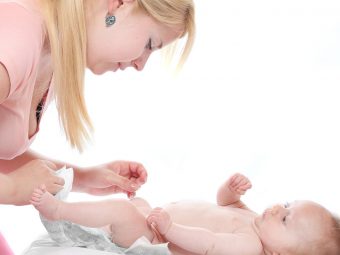
Image: iStock
Uterine pain in early pregnancy is common and indicates your body is preparing for the pregnancy. The pain may be due to several reasons, such as stretching the uterus or hormonal changes. You are also likely to experience low-back or pelvic pain due to these changes. The pregnancy journey is accompanied by significant physical changes, some of which are natural to maintain a healthy pregnancy. However, it is essential to understand the symptomatic difference between the pains since some may indicate complications such as ectopic pregnancy or miscarriage.
Learn about the common causes of uterine pain in early pregnancy, when to worry, and the treatment management.
When Does Uterus Pain Start In Pregnancy?
Image: Shutterstock
You may start experiencing mild or sharp uterine pain during the first trimester or within the first 12 weeks of pregnancy. It is similar to period or “stitch” like pain (1).
What Causes Uterus Pain In Early Pregnancy?
Some possible causes of uterus pain in early pregnancy include:
- Stretching of the uterus: As you reach the 12th week of pregnancy, you may feel uterus pain as it expands out of the pelvic area to the size of a grapefruit. The stretching may be accompanied by symptoms such as period-like cramps and mild spasms. In twin or multiple pregnancies, the stretching of the uterus may begin earlier, and hence you can feel the pain before 12 weeks (2) (3).
- Gas or constipation: The increased progesteroneiXA female reproductive hormone that plays an important role in menstruation, pregnancy, and breastfeeding level in the body is one of the primary reasons for gas or constipation during pregnancy. The hormone induces increased relaxation of the intestinal muscles resulting in slower digestion. Thus, the bowel movement through the intestinal tract slows down by 30%, allowing gas to accumulate (4). The symptoms are similar to stretching the uterus and generally do not cause severe discomfort.
Image: Shutterstock
- Round ligament pain: The connective tissues in the pelvis attached to the uterus are called round ligaments. When the uterus begins to expand, these ligaments tend to resist the pull, causing the pain. You may feel a sharp pain on both or either side of the lower pelvic area (5).
- Pelvic floor pain: A pelvic floor consists of muscles, connective tissues, and ligaments that lie beneath and support the bladder, rectum, uterus, and vagina (6). Pain in the vagina, bladder, abdomen, back, or near the uterus indicates pelvic floor pain. Commonly, it may be masked as uterine pain due to the expansion of the uterus or the relaxin hormone. The hormone produced enables relaxation of the uterine wall while giving birth and can induce pelvic pain in early pregnancy (7).
 Point to consider
Point to considerImage: Shutterstock
When To Worry?
In most cases, the uterus pain you feel during the first trimester may not be harmful. However, some specific concerning symptoms could indicate a complication.
- Miscarriage: In every pregnancy, there is a chance of miscarriage, and if they do occur, it is likely to happen before 20 weeks of pregnancy. Therefore, if the pain does not go away or persists for longer periods and is accompanied by bleeding, sudden cramps, vaginal spotting, or low-back pain, it may be a miscarriage (7) (1).
Image: Shutterstock
- Ectopic pregnancy: At times, the fertilized egg may get implanted outside the uterus, such as in the fallopian tubeiXA hollow tube-like structure that connects ovaries to the uterus and forms a channel for the transportation of the eggs , resulting in an ectopic pregnancy. In such a case, you need to watch out for signs such as severe pain on either side of the lower abdomen, bleeding, dizziness, or difficulty in passing stool or urine (7) (1).
- Ovarian torsion: The presence of the corpus luteal cystiXA functional ovarian cyst that is formed when the corpus luteum fails to relapse and keeps growing after the release of an egg during the first trimester that helps support the pregnancy may sometimes overgrow, causing the ovaries or the fallopian tubes to twist on the surrounding tissues. This is called ovarian torsion, which may occur between the sixth and 14th weeks of pregnancy (8). You may experience severe pain with vomiting, dizziness, and sudden cramps that can continue for days to even weeks. The torsion prevents the blood supply to the ovaries and requires medical assistance (9).
 Did you know?
Did you know?How To Treat Uterine Pain In Early Pregnancy?
An ultrasound, hCG blood test diagnose pain, or both depending on its symptoms and severity. Accordingly, the treatments will vary, such as if an ovarian torsion or ectopic pregnancy is detected–surgery is the only option to prevent further complications (2) (7).
If no alarming conditions are detected, you may try the following home remedies of prenatal care to manage the condition after consulting with your OB/GYN (5) (7).
- Drink plenty of water and fiber-rich foods to prevent and manage gas and constipation.
Image: Shutterstock
- Relax with a warm bath or use a heating pad, ensuring it is not too hot.
- Switch between sleep positions–lying on your back and sleeping on your side with a pillow to support your belly.
- Incorporate pregnancy-safe exercises that involve light stretching in your routine.
- Massage the pain area gently without putting too much pressure on it.
- Keep your knees close to your chest to take the pressure off your uterus.
Frequently Asked Questions
1. How can I feel my uterus in early pregnancy?
You can feel your uterus by touching your growing belly
2. Can I feel the uterus stretching at four weeks?
In the first few weeks of pregnancy, the uterus does not go through any expansion or other significant changes. It is only around the 12th week that you may experience the uterus stretching with mild pain.
3. Can an ectopic pregnancy move to the uterus on its own?
Ectopic pregnancy cannot move or be moved to the uterus from its place of implantation. It always requires medical or surgical treatment for removal, depending on the location and weeks of gestation (10).
Although uterine pain in early pregnancy is common, it can be an overwhelming experience with the recurring pain and discomfort, especially for first-time moms. However, it is okay to be concerned but do not hesitate to consult your doctor when in doubt. Sometimes the signs may not be too evident. Therefore stay mindful of the alarming signs and seek medical care for prompt treatment to prevent further complications. Additionally, follow the tips to stay healthy and prevent such issues altogether.
Infographic: Ways To Manage Uterus Pain In Early Pregnancy
Uterus pain is common during pregnancy but should not be ignored if persistent. Some pains may indicate pregnancy complications. The infographic below suggests some home remedies for uterus pain in early pregnancy. Consult your doctor if symptoms do not resolve in a few days.

Illustration: Momjunction Design Team
Get high-quality PDF version by clicking below.
Download Infographic
Key Pointers
- Uterine pain has been considered a normal indication of pregnancy.
- It occurs in early pregnancy due to stretching and growth of the uterus.
- Other causes of uterine pain in early pregnancy include implantation cramping, round ligament pain, and ectopic pregnancy.
- Mild uterine pain during pregnancy can be treated with home remedies such as a gentle massage or heating pad.
- Severe or persistent uterine pain in early pregnancy should be evaluated by a doctor.
References:
- Stomach (abdominal) pain or cramps in pregnancy.
https://www.tommys.org/pregnancy-information/pregnancy-symptom-checker/stomach-abdominal-pain-or-cramps-pregnancy - When should cramps during pregnancy be worrisome.
https://wfmchealth.org/maternity-health-care/when-should-cramps-during-pregnancy-be-worrisome/ - Uterus size during pregnancy.
https://americanpregnancy.org/healthy-pregnancy/pregnancy-health-wellness/uterus-size-during-pregnancy/ - Pregnancy gas.
https://americanpregnancy.org/healthy-pregnancy/pregnancy-health-wellness/gas-during-pregnancy/ - Growing pains during pregnancy are normal.
https://intermountainhealthcare.org/blogs/topics/intermountain-moms/2014/01/growing-pains-during-pregnancy-are-normal/ - About pelvic floor disorders.
https://bladder-pelvic-health.wustl.edu/pelvic-floor-disorders/ - Uterus pain: Learn about the causes and treatment in early pregnancy.
https://www.medanta.org/patient-education-blog/what-causes-uterus-pain-in-early-pregnancy/ - Randall Young and Kelly Cork (2017). Intermittent Ovarian Torsion in Pregnancy.
https://www.ncbi.nlm.nih.gov/pmc/articles/PMC5965408/ - Ovarian torsion.
https://www.yalemedicine.org/conditions/ovarian-torsion - Ectopic Pregnancy.
https://www.acog.org/womens-health/faqs/ectopic-pregnancy#:~:text=An%20ectopic%20pregnancy%20cannot%20moveare%20required%20with%20each%20treatment




